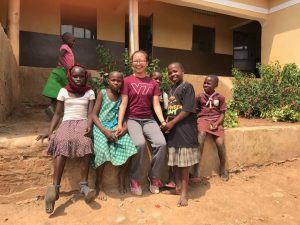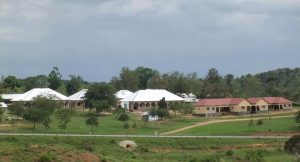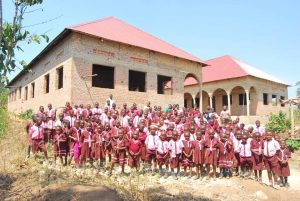Education for Africa–Is it the best solution to break the cycle of poverty and whose responsibility?
“Education is the most powerful tool you can use to change the world”– Nelson Mandela. I wrote this piece for the National African Students Association newsletter.
You are reading this blog and my best assumption is that you are literate. Have you ever imagined what your life would be like if you couldn’t read or write? Where would you be now? What contribution would you make to your family, to your community, to your country? To me, my world would be turned upside down. Now imagine: your parents have only a fifth grade education. The most educated person in your village made it only up high school. Your family lives on less than two dollars a day. Or else, at age 12, your parents have died; you are left to cater for your three little siblings. There is no public assistance. You have this big dream of becoming a great scientist. Calculate your odds of achieving this dream. Depressing? This is not fiction; it is a typical life story of hundreds of thousands of kids in Africa stuck in this cycle of poverty. I strongly believe, from my experience, that the only way to break this cycle of poverty and ensure the prosperity and self determination of the African people is to invest in resources that provide access to quality education for these kids. This is where Uganda Rural Fund (URF) and many other reputable organizations come in.
your life would be like if you couldn’t read or write? Where would you be now? What contribution would you make to your family, to your community, to your country? To me, my world would be turned upside down. Now imagine: your parents have only a fifth grade education. The most educated person in your village made it only up high school. Your family lives on less than two dollars a day. Or else, at age 12, your parents have died; you are left to cater for your three little siblings. There is no public assistance. You have this big dream of becoming a great scientist. Calculate your odds of achieving this dream. Depressing? This is not fiction; it is a typical life story of hundreds of thousands of kids in Africa stuck in this cycle of poverty. I strongly believe, from my experience, that the only way to break this cycle of poverty and ensure the prosperity and self determination of the African people is to invest in resources that provide access to quality education for these kids. This is where Uganda Rural Fund (URF) and many other reputable organizations come in.
URF, founded in 2005, is a registered grassroots nonprofit organization empowering AIDS orphans, impoverished youths and women to break the cycle of poverty in rural communities, through creation of educational and sustainable development opportunities. URF was started as an effort to create tangible sustainable solutions to the needs of hundreds of orphans in his home village inspired by his own experience of growing up poor and being in and out of school due of lack of funds for school fees. Without education I wouldn’t be who I am today or be able to do what I do. Education can us champion development for our communities to lift them out of poverty.
With a strong emphasis on education, we believe that it is the best solution to break the cycle of poverty plaguing Africa. In rural communities, orphans and kids from poor families don’t have access to sponsorship opportunities or good education. The majority of the available schools are under-funded, have shortage of teachers and classrooms, and have neither libraries nor science labs which are essential to learning. They can’t compete favorably with kids from urban schools which have good resources. In Uganda, the educa

tion system and its government university scholarship program perpetrates the cycle of poverty. Those with the highest points/grades qualify for government scholarships. But who scores the highest grades? It’s the kids from rich families attending the best schools. So, these students whose parents can afford to pay for their university education get a free ride. The orphans and the poor who deserve these scholarships can’t qualify because they have poor grades, which is a result of being in poor rural schools. Hence, the poor remain in their place, the rich get free education, their parents save and accumulate more wealth, and the cycle of poverty continues.
Do things have to remain that way? NO. And who is going to liberate the rural poor? We’ve got to do something, especially those of us with strong roots in these communities. We can’t wait for outsiders; we have to step up. It’s us, the African children who have the potential to unleash Africa’s potential, as President Obama reminded us. Everyone has to do something within their means to lift up the lives of those we have left behind. It would be a shame if we, both in Africa and in the West, who have been successful, to simply focus on our own advancement in education and economic progress without thinking of our brothers and sisters struggling to get out of poverty in the trenches of our home villages. I believe we have the potential; we just need the will and the passion to do it. The future of Africa will be determined by the efforts we make today to address these critical challenges of our motherland. It’s our responsibility to fix Africa. If we don’t, we will? Commit to doing something starting today!
URF’s after-school program and the Hope Integrated Academy, aim to address critical educational gaps in the rural communities. When I was going to school, I couldn’t get any help on homework at home because my parents were uneducated; the only thing they could offer was to encourage me to study hard. At home, there wasn’t a text book to refer back to or Google to look up information. Without a library at school, the class notes is the only resource you have to study from.
The Hope Academy (www.hopeacademyuganda.org) which combines both secondary and vocational training, opened with 7 students in May 2008 and by the beginning of 2009, the student population jumped to 120. The Academy provides a well-rounded practical education for kids who had dropped out of school, orphans, and kids from child-led families, with a strong emphasis on entrepreneurship, responsible leadership, and community service in an effort to build up grassroots leadership base which I believe is key to cleaning up the mess and greed in Africa’s leadership. URF has secured sponsorship for 56 orphans in addition to supporting over 24 child-led families and an orphanage with 25 children. Students with no guardian or sponsor study for free until we find them a sponsor. We have plans for expanding up to 1000 students over the next six years after adding dormitories.
To improve the quality of education in the villages, URF has established a community library and a computer center with Internet accessible to everyone. The Academy provides infrastructure for a community resource center for programs like adult literacy, youth and women empowerment, community seminars, youth leadership camps, HIV/AIDS awareness, and agricultural training. URF has worked with Engineers Without Boarders to bring clean water, sanitation, and solar energy to the community. We have also given out over a 1000 mosquito nets in the fight against malaria.
Over 300 women are benefiting from projects associated with the women empowerment program which is aimed at providing women with practical skills and opportunities to earn income to sustain their families. Their activities include: community workshops addressing issues such as domestic violence, parenting skills, nutrition, health care and HIV/AIDS, human rights, etc, village banking run solely by the women themselves – a model in which a person buys in shares and has the opportunity to get a small loan without need of collateral, art and crafts, piggery and poultry for income generation. URF is also reaching out to men on similar projects to ensure balanced community development.
Ways to get involved: you can start a URF chapter at your campus or have your existing club partner with us, fundraise for URF, form sister school partnership with Hope Academy and your school, volunteer in Uganda or here in the States, sponsor an orphan ($25/month, $100 a term, or $300/year), or make a tax-deductible donation.
For more information, please contact John Mary at jmlugemwa@ugandaruralfund.org




1 Responses to Education for Africa–Is it the best solution to break the cycle of poverty and whose responsibility?